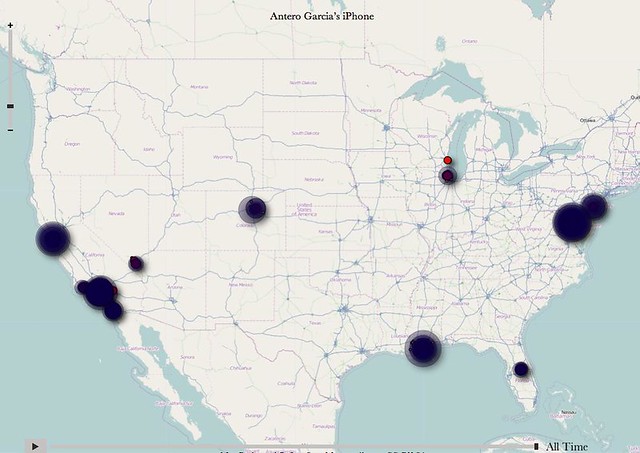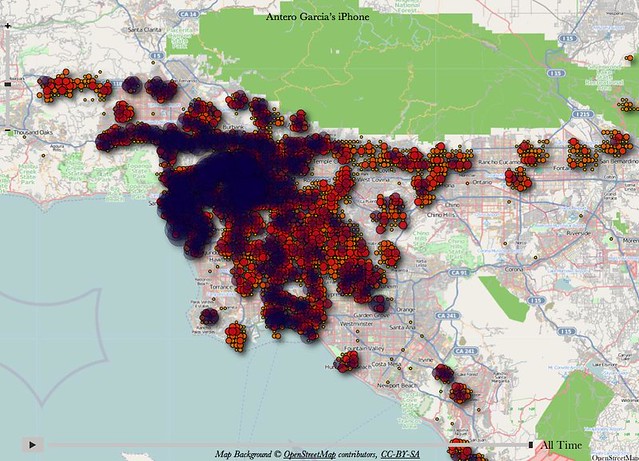
So I guess the above map is about right. The location tracking for my phone only started when I switched to the iPhone 4, so the map above is indicative for a little less than a year at this point. Hey, check it out, you can see where I live:

Oh, if you haven’t heard, it was recently discovered that iPhone systems have been tracking where the phones have been and keeping a log on your computer. You can read more about this and see a visualization of your phone’s movement over here. [And since the map can be read down to street level, it is relatively easy to simply find the most frequently visited locations to deduce one’s residence, work place, hangouts, etc.]
If anything, the information here poses a couple of significant opportunities for us as educators. Several of my social studies colleagues were recently awarded a UCLA Teaching Initiated Inquiry Project grant to focus on GIS-related skills. How great could this kind of track data be to look at the movement patterns of youth in and around the city?
I can’t say I’m all that surprised that a log of where my phone has been is being maintained. Frankly, I wouldn’t even be surprised if I were to later find out that the information is being sent elsewhere – it would not be that different from targeted advertising in my Gmail or Facebook accounts. What’s important to realize here is that, once again, the notion of what we teach in terms of critical literacy is expanding. Not only do we need to teach students how to use new media tools but also to question and understand the implications of their use. The wording difference may be slight, but this is a significant change in what literacy development means.
In a sense, we are looking at a symbiotic relationship between a tool and its wielder; we rely on mobile media devices throughout the day for various functions and it too tracks and maintains a log of where and what we are doing.
Of course, the real problem is that this data becomes tied to individuals. Pinpointing migrant patterns of undocumented students, for instance, would be a serious concern. Likewise, after school locations of gang-affiliated students, congregation areas for truancy or just about any kind of published data about where someone is if they don’t wish that information to be known is a real concern. Put even more clearly, the FAQ on the iPhone Tracker site states:
The most immediate problem is that this data is stored in an easily-readable form on your machine. Any other program you run or user with access to your machine can look through it.
The more fundamental problem is that Apple are collecting this information at all. Cell-phone providers collect similar data almost inevitably as part of their operations, but it’s kept behind their firewall. It normally requires a court order to gain access to it, whereas this is available to anyone who can get their hands on your phone or computer.
By passively logging your location without your permission, Apple have made it possible for anyone from a jealous spouse to a private investigator to get a detailed picture of your movements.
Literacy development today includes understanding the rights we sacrifice in stepping into the realm of participatory media. Cognizance of how search is being manipulated, of how we are being marketed to on Facebook, and of how your movements are being tracked are all new skills that need to be developed within students today. If we are serious about thinking beyond the work of New London, I am arguing here that literacy development is going to be about the underlying symmetry of use and cognizance when interacting with cloud-connected tools.
The participation with cloud mobile media I knowingly enter into scares me enough. It is my unknown interaction with this big brother sharing that needs further examination, agreed. Students need to know. Now how is the fun part!